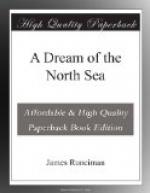The man who shoved the cork fender over the side had received a graze which sent a big flap of skin over his eye and blinded him with blood. He laughed when Lewis dressed him, and said, “That was near enough for most people, sir. I’ve seen two or three like that in a night.”
“Well, I like to see you laugh, but I thought all was over when I saw he was going to give us the stem.”
“So did I, sir; but fishermen has to git used to being drowned.”
As Lennard and the doctor sat filling the crew’s cabin with billows of smoke, the former said—“There’s a kind of frolicsome humour about these men that truly pleases me. Frolicsome! isn’t it?”
“Well, we’ve stood another dreary day out; but think of those poor beggars aft, lying in pain and loneliness. Tom, let’s say our prayers; I don’t know that there’s much good in it, but when I think of twelve thousand men bearing such a life as we’ve had, I think there must—there must be some Power that won’t let it last for ever. Mind, when we’ve done praying, no more sentiment; we’ll smoke and laugh after we’ve put in a word for the fishermen—and ourselves.”
“And somebody else.”
“Who?”
“I’ll write and ask Mr. Cassall. That’s Miss Dearsley’s uncle.”
I have seen our Englishmen fool on in that aimless way during all sorts of peril and trouble. I want you to understand that the evangelist and the sceptic both were prepared to hear the scraunch of the collision on that deadly night; they had seen two entire ships’ companies lost since they came out, yet they would not give in or look serious altogether. They had come to found a hospital for the mangled hundreds of fishermen, and they were going through with their task in the steady, dogged, light-hearted British way. Foreigners and foreigneering Englishmen say it is blockheaded denseness. Is it?
CHAPTER II.
A CRUCIAL TEST.
“When you sailed away in the Yarmouth ships,
I waved my hand as you passed the pier;
It was just an hour since you kissed my lips,
And I’ll never kiss you no more,
my dear.
* * * * *
“For now they tell me you’re dead and
gone,
And all the world is nothing to me;
And there’s the baby, our only one,
The bonny bairn that you’ll never
see.”
("The Mate’s Wife,” by J. Runciman.)
Suffering—monotonous, ceaseless suffering; gallant endurance; sordid filth; unnamed agonies; gnawing, petty pains; cold—and the chance of death. That was the round of life that Lewis Ferrier gazed upon until a day came that will be remembered, as Flodden Field was in Scotland, as Gettysburg is in America, as January 19th, 1881, is in Yarmouth. Ferrier had stuck to his terrible routine work, and, as Sir Everard Romfrey observes: “To stick to work after the great effort’s over—that’s what shows the man.” The man never flinched, though he had tasks that might have wearied brain and heart by their sheer nastiness; the healer must have no nerves.




